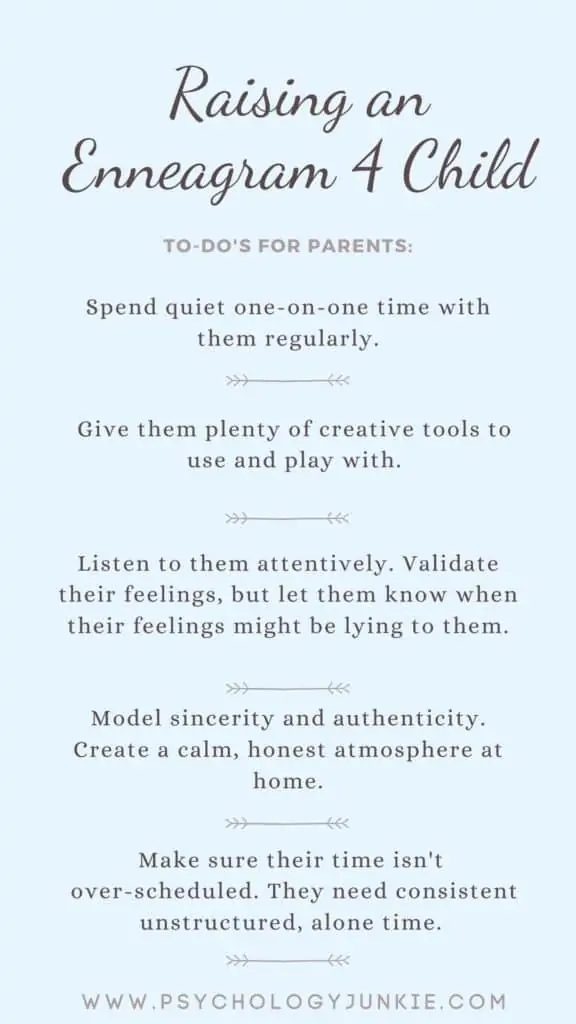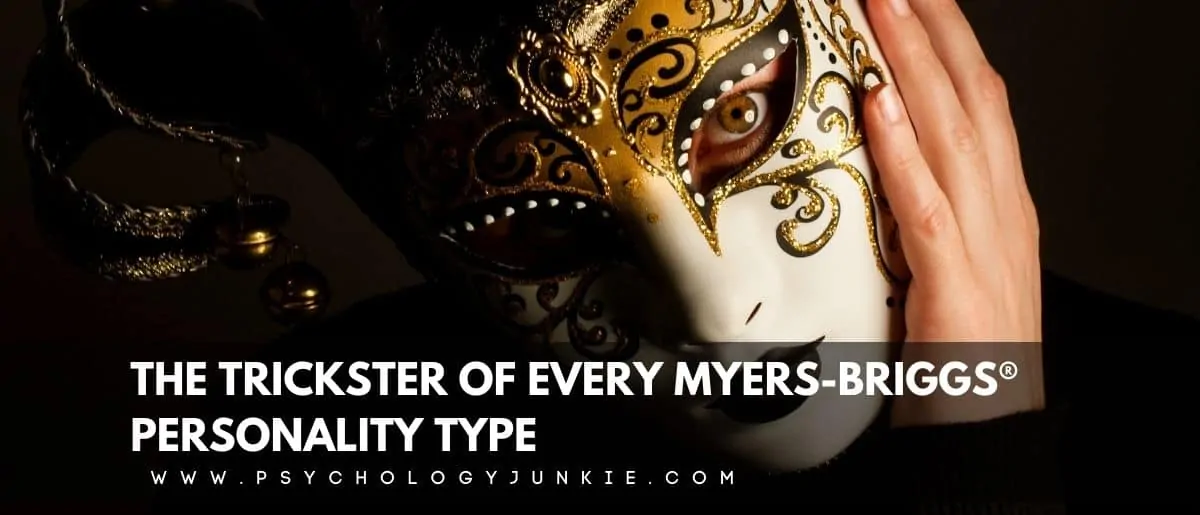The Enneagram Four Child
Called “The Individualist”, the Enneagram 4 child is known for rich, vivid emotions and an ability to connect with the human experience. Fours face the darker sides of life, not shying away from emotions and thoughts that others suppress. They bring sensitivity, intuition, and self-awareness to the world and can be profoundly creative and original. How can you identify a child who is also a Four Enneatype? How can you sink into their shoes to understand their experience better? That’s what we’ll be exploring in today’s article.
Not sure what your Enneatype is? Take our free Enneagram questionnaire.

Table of contents
Estimated reading time: 7 minutes
An Overview of the Four Enneatype:
- Part of the Heart triad (along with Twos and Threes)
- Can have a 3 wing or a 5 wing (4w3 or 4w5)
- Nicknamed “The Individualist”
- Vice: Envy
- Virtue: Equanimity
- Integrates to the One (the Perfectionist) under growth
- Disintegrates to the Two (the Helper) under stress
- Basic Desire: To find themselves and their unique identity – to create something from it
- Basic Fear: To lack identity or personal significance
Signs That Your Child Might Be a Four Enneatype:
- They are highly individualistic
- They are deeply focused on their feelings and emotions
- They spend a lot of time “in their heads”
- Their feelings are easily hurt
- They want to be unique and/or different
- They have a vivid imagination and enjoy fantasy play
- They have a dramatic streak
- They appreciate the arts a great deal
- They have a unique way of seeing the world
- They are prone towards melancholy feelings
- They collect items that have sentimental value to them
- They hate mundane or tedious projects
- They worry about whether or not they “belong”
- They find special meaning where others don’t
- Rather than craving a lot of friends, they want one “kindred spirit” or close friend
Strengths of the Enneagram Four Child:
When nurtured and appreciated for who they really are, Fours bring creativity, authenticity, and originality to the world around them. Because they are so in touch with their deeper feelings they can also empathize with the feelings of others. Their self-awareness gives them depth and honesty that encourages others to be authentic without fear.
Fours often have a soft spot for the underdogs of the world. They are likely to feel intense empathy and concern for anything from endangered species to other children who are bullied. Their sensitivity can be a strength that allows them to stand up against bullies or unfairness.
Healthy Fours are deeply creative and have a knack for seeing meaning and beauty in things that others discard or ignore. They may be able to create a beautiful picture out of scraps of materials or write a poem that perfectly explains a childhood emotion or experience. Fours who aren’t as skilled in the arts may channel their creativity into unique business ideas (making a hot chocolate stand instead of a lemonade stand, for example) or fantasy play. Their imagination is often rich with colors, possibilities, and sweeping images.
Struggles of the Enneagram Four Child:
Probably the most common frustration of the Four is feeling misunderstood. In many families, parents try to suppress their child’s rich emotions, telling them to go to their room if they’re going to cry or to “toughen up.” Many times Fours are shy and feel overwhelmed by social settings. A full day at school can feel oppressive, and they may feel unable to get out of their shell and connect with other children.
Transitions are often difficult for Fours. They may feel intense waves of relief when the school day on Friday is over, only to feel stomach-churning anxiety all day Sunday about the next school day. It’s helpful if parents can help them transition smoothly. For example, if they can pick out their clothes for the school day on Monday and try out a hairstyle that they love they may feel less worried about all the details of getting ready for school.
Not all Fours are socially anxious or shy, however. But they are nearly all emotionally sensitive. This can be difficult if there is conflict in the family or if they are forced into things they aren’t ready for. For example, if parents are arguing at the dinner table, they may feel unable to swallow their food. Their imagination might create enormous situations in their mind based on triggers that wouldn’t bother other children. One parental argument and the Four might think divorce is inevitable and spend hours fretting over which parent he will live with. Criticism and correction are also very sensitive areas for the Four. They can feel overwhelmed by parental disappointment or frustration, retreating into their shells or feeling like they’ll never be accepted.
The more emotionally turbulent a Four is feeling, the less focus he or she will be able to devote to responsibilities. They may have a disastrous room or unfinished homework as they try to grapple with dark feelings or emotional confusion. In order for Fours to turn in their best work, they need to feel emotionally calm and accepted.
Tips for Parenting an Enneagram Four Child:

- Listen to them. Make time each day to just be with them (get out some coloring books and color together, sit with them before bed and ask them about their feelings).
- Fours can veer towards melancholy and pessimism. Validate their concerns and feelings, but help them work through pessimistic scenarios by asking them, “and what will happen if that happens?” Often through this series of questions, you can assure them that no matter what happens, things will still be “okay” and there will always be solutions and opportunities. If nothing else, you will always be there to help them and love them unconditionally.
- Give them plenty of creative tools to experiment with and unstructured time to use those tools.
- Spark their vivid imagination with daily storytelling.
- Listen to them as they discuss their favorite movies or music. In their teens try to listen to their favorite songs (and don’t get judgmental if you dislike them!).
- Find things that are unique to them that you appreciate. Point these things out verbally and show your appreciation for them.
- Create an atmosphere in your home where they feel free to express their joy and their sadness. Don’t try to force them into happy feelings at all times.
- Let them know what new situations are going to be like in advance so they don’t feel anxiety about them.
- Make sure that mealtimes and bedtimes are calm and conflict-free.
- Respect their need for quiet alone time. Try not to over-schedule their day.
- If they are frequently overwhelmed by pessimistic, dark feelings, don’t be afraid to get them connected with a counselor or child therapist. This isn’t a failure on your part (or theirs!)
- Encourage them to bring their passions out into the real world. Fours may get too wrapped up in their inner world at times and feel trapped. Discuss options like attending an art class, drama class, or picking up trash along a beach or at a park. It’s important for Fours to balance their alone time with healthy, enjoyable, active experiences that coincide with their interests and strengths. They often love pets!
Other Articles You Might Enjoy:
The Enneagram Four – The Individualist
7 Struggles of the Enneagram Four Personality Type
Enneagram Type Four – The Enneagram Institute
Want to learn more about the Enneagram? Check out these books!
These links are affiliate links. This means if you purchase one of these eBooks I get a small commission that I can use to keep Psychology Junkie running smoothly.
Personality Types: Using the Enneagram for Self-Discovery
What Are Your Thoughts?
Do you connect with this article? Do you have any insights or stories to share? Give us your feedback in the comments!
Find out more about your personality type in our eBooks, Discovering You: Unlocking the Power of Personality Type, The INFJ – Understanding the Mystic, The INFP – Understanding the Dreamer, and The INTJ – Understanding the Strategist. You can also connect with me via Facebook, Instagram, or Twitter!













I’m now a young 4w5 adult but based on my experience and self knowledge I think this is pretty spot on .
I wish at times that I could go back and do things differently for the sake of my younger self now knowing what I do about myself, articles like these would have gone a long way for myself and people around me
Thanks for your writing , it’s informative and often rings true for me
I am actually an ENFJ. I love all the Myers Briggs information and it is spot on and I also have a Enneagram four child so it is wonderful learning. He is a teen and we have lots of discussions and a great relationship so it is good to pass on personality types info to help explain certain things better. Thank you. 🙂
I’m so glad that you’re enjoying the information and that it’s helping!! Thanks for your input 🙂
I am a type four and the oldest child in my family. I always deeply felt I was not good enough, even as I tried my very hardest to be the “Perfect Child” for my parents. My efforts to be good were rewarded, so I thought that being Perfect was who I was supposed to be.
But then I would have moments where I felt totally defeated, crushed, broken. Like my soul was hiding somewhere in the deep recesses of my body, just bleeding to death. I felt horribly flawed and awful, and I knew it was my fault. I grew up in a very religious family, and I knew God would never love me less and make me born flawed. So I must have abandoned God and flawed myself.
It was awful. Nobody understood me (honestly, I’m not just being a dramatic four here) and when I tried to be extraverted and make friends, or be kind, I was bullied. If I wasn’t bullied, I would go home crying, because being extraverted was so hard and it got me nowhere.
Then, learning about the enneagram, type fours are constantly, horribly beaten upon. The only good traits I have ever seen about them are “creative and authentic.” I felt like a horrible person, because all the other traits must apply to me too: dramatic, self absorbed, spiteful, jealous, and using ‘I didn’t feel inspired,’ as an excuse to not do something.
I honestly kind of wanted to just die.
So to all you other fours out there, I swear, YOU ARE NOT ALONE. The people who write those nasty articles or make those horribly depressing videos probably don’t know any fours in real life. We’ve even been stereotyped in literature; there are no happy, full fours in literature ANYWHERE.
So fours, believe me when I say, it is a GOOD thing to JUST BE YOU. We are NOT worse than any other type. We are just as good, in a completely unique way that some people don’t quite understand.
So thank you to psychology junkie for this post…because it was nicer than most of the stuff out there.
I love you all, every type and every individual out there!
-Amoeba
You and I must have had the same parents! I felt every single word you said because I lived it too. Very similar situations and circumstances, except for when you said you’d go home crying……when I went home crying, I was completely invalidated. Things were said to me like, “You’re scaring the cat/dog/your sister”, or, “Why are you being so dramatic???” I actually wasn’t bullied at school except for in kindergarten, but after that until my sophomore year, I wasn’t bullied. However, as an adult, I’m making up for all those years I wasn’t as I’m bullied a lot. And I’m 50 years old. But yeah, I really felt your words and I so get you. Sending a big, validating, dramatic hug to you! ~Monie
I don’t think my previous response to you went through. Figures. I just wanted to say I felt everything you said and then some and I really appreciate you for this. Sending you a big validating, dramatic hug!
I know this is a couple years old now but I feel like I could have written this myself. I can relate to just about every word you have said. It’s so validating to feel like someone else out there gets you. Thank you and I hope you are doing well these days xo
Everything that was supposed to be done with/for me as a 4, wasn’t. I was never even hugged as a kid or told I was loved. Not until I was probably 18-20 years old anyway. No wonder I’m so f****d up. I’ve always felt like I was robbed of my childhood–I had no idea how badly though. As a matter of fact, the opposite was done in many cases–what does being invalidated, denied closeness and nurturing and I guess one could say neglected as a kid, do to a type 4 when they become an adult? It’s not pretty, I can assure you. Thanks mom and dad. You two really didn’t need to have kids cuz you knew nothing about how to be parents and you never even tried to be better to us.